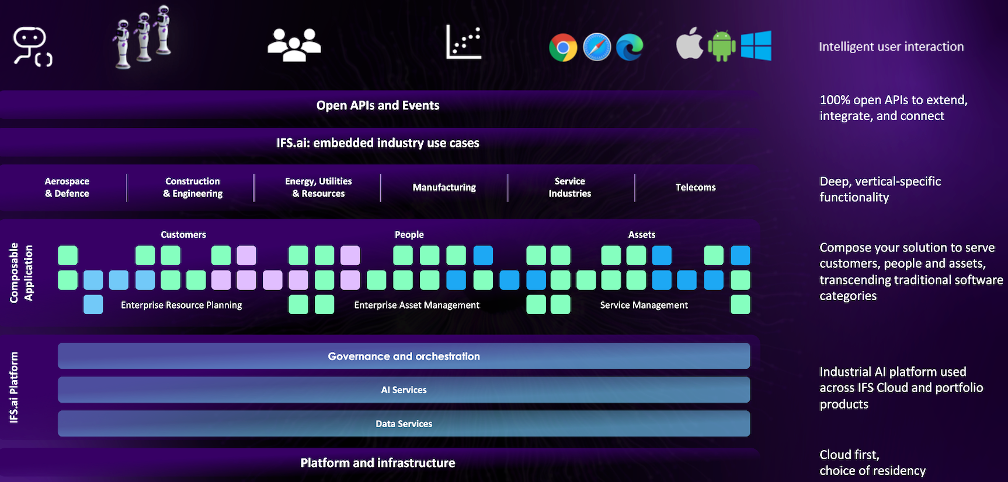2025.6.12:Operationalizing Industrial AI: IFS Connect 2025 (Commentary)
Key Takeaways
- IFS Connect 2025 convened in Nashville, TN on 2-4 June, 2025, one in a global series of regional user events conducted by IFS, a global enterprise software company.
- IFS announced IFS.ai in 2023 and has worked diligently to build out the technology, with over 200 use cases spanning their applications and industries.
- Their embedded AI approach brings the power of generative AI (genAI) to the moment of service while easing adoption and use compared to more generalized AI implementations.
- IFS Connect 2025 provided a call to action for IFS’ customers to embrace their expanding IFS.ai capabilities, offering tools to support justifying their investment and calculating their ROI, as well as strong deployment and enablement capabilities to speed time-to-value (TTV).
CIMdata had the pleasure of attending IFS Connect 2025 in Nashville, TN on 2-4 June 2025.[1] According to IFS, about 350 attended live. IFS last held a global user conference in October 2024, IFS Unleashed, and plans to hold their global event every two years.[2] The Nashville event was one of a series of regional Connect events held around the globe to better reach their expansive customer base.
Day one included focused sessions for different IFS interest groups: the North American Partner Summit, a meeting of their Energy, Utilities, and Resources Customer Advisory Board, sessions on the future of field service and asset management, a Poka User Community meeting, and a Copperleaf Super User track. Poka and Copperleaf were recent IFS acquisitions, in 2023 and 2024 respectively.
Day two offered the most content, with plenary sessions in the morning, followed by breakout sessions for the rest of the day. Mr. Matt Breslin, IFS President of North America, opened the session and acted as emcee for the main stage presentations. While new to the company (he said only 100 days in), his enthusiasm for IFS and IFS.ai, an initiative announced in 2023, was infectious.[3] Like other software companies, IFS has used AI to support use cases in its portfolio for years. But the introduction of generative AI (genAI) in 2022 opened up many new possibilities to support human endeavors.
GenAI can be applied in one of two ways. Some applications are embedding genAI, where the capabilities are built into existing systems that support industrial use cases. AI already infiltrated existing systems, such as ubiquitous chatbots and recommendation engines. Embedded genAI brings these capabilities into users’ current workflows and enterprise applications. For example, leading enterprise software companies like Microsoft and IFS are building these capabilities into their enterprise systems to bring augmented intelligence to the “moment of service,” to use an IFS coined phrase.[4] Extended genAI focuses more on stand-alone systems.
Mr. Breslin cited a recent Bain study that said 87% of businesses are investing in AI, a number he felt was too low. Business investment often requires financial justification. To support their clients, My. Breslin highlighted their new IFS AI Calculator. Based on data from their early adopters, the calculator can choose use cases of interest and calculate the possible financial returns. In CIMdata’s industrial consulting we often work with companies to make such calculations, and most struggle with providing the necessary baseline data. IFS is trying to take the guesswork out of the process and their approach looks innovative and promising. For example, their IFS Asset Investment Planning offering leverages Industrial AI to complement their leading enterprise asset management (EAM) capabilities.[5] Users can easily model asset investment alternatives, plan, their execution, and assess their potential benefits. A digital twin of their investment, if you will.
Mr. Simon Niesler, IFS Chief Revenue Officer (CRO), joined Mr. Breslin on the stage and offered some important facts and figures. Mr. Niesler reiterated that IFS always has AI at the heart of their applications. Why should customers place their AI bets on IFS? They have a track record of growth, and a reputation for “credible innovation” with their customers. Their recurring revenues are over $1.25 billion, and supporting only 6 industries gives them a focus that their competitors lack. He claimed they spend 50% of their R&D on AI, a huge number. They already offer over 200 use cases spanning their applications and industries. Mr. Niesler believes that AI is the biggest shift since cloud, and the Internet before that. In fact, Mr. Niesler went further, arguing this shift is as big as the Industrial Revolution. CIMdata agrees this is indeed a revolution across industry. According to Mr. Niesler, the next decade belongs to those who industrialize AI the fastest and IFS wants to help their customers be on the winning team. Time will tell if Mr. Niesler’s belief holds true.
IFS customers are already seeing benefits. Mr. Niesler cited Konica Minolta, a global firm with over 2 million customers, with 150 operating companies. They recently went live with IFS and its embedded AI. The adopting groups saw a 21% improvement in Service Level Agreement (SLA) adherence and they slashed fuel costs to support their fielded products, among other benefits. SLA adherence is the lifeblood of profitable product-as-a-service strategies that are much more common in this age of smart, connected products. To help boost customer adoption, Mr. Niesler cited IFS Nexus Black, a recently introduced rapid, high impact strategic innovation program.[6] It includes an “elite strike force” with deep industrial and AI expertise that works with customers to jointly solve thorny problems to help bring Industrial AI to life. This initiative is yet another example of IFS’ investment to support effective technology adoption, and CIMdata applauds their support beyond just technology to equally consider the people and processes impacted by their new offerings.
Mr. Christian Pedersen, IFS Chief Product Officer, used a historical example to characterize where we are today with AI. While the first steam machine appeared in 1714, it was only when it was applied in factories that it revolutionized industry. He argued that putting it on wheels in steam trains revolutionized transportation, and helped unite the United States, and created early supply chains. While steam seems antiquated, Mr. Pedersen noted that it is still crucial to power generation today. Just as steam needed practical application, so does AI: it is how it is applied that matters. Mr. Pedersen said IFS is well positioned to come up with such applications, particularly because of their focus on only six industries. And those six share one common thread: a focus on long-lived physical assets.
Mr. Pedersen shared their overall solution architecture, as shown in Figure 1. He stated they can deploy in both public and private cloud environments. They realize the need to use data from many sources beyond the IFS portfolio, and their APIs and data services facilitate gathering and sharing information.

Figure 1―IFS Cloud Architecture
(Courtesy of IFS)
Mr. Pedersen described five key attributes of their AI approach:
- Intelligence is always provided in context, with that context provided by customer data to support Retrieval Augmented Generation (RAG) approaches.
- Their solution is secure and private. Customer data is never used to train models, only to provide the right context for the answers provided. IFS can support geographic hosting requirements and many security regimes, including ITAR, EURA ISO 27001, SOC I and SOC II.
- Their AI is embedded and turnkey. Extended AI is stand-alone and is just another system that companies need to install and maintain. It also requires data scientists to help with data and constructing the appropriate prompts to generative AI. Embedded AI is meant to be turnkey. IFS embeds AI in their applications, plans for the data needed for its use, and builds the prompts to provide that intelligence at the moment of service.
- Their AI approach is trustworthy, explainable, and ethical. Explainability is key, and has been since the earliest applications of AI. Understanding the basis for an AI-generated response is key to building credibility in AI users.
- Their embedded capabilities are open and extensible. IFS Cloud supports open REST APIs and provides low-code tools for tailoring the solution or building new task applications.
Dr. Nick van der Meulen, a Research Scientist at the MIT Sloan Center for Information Systems Research provided some thought-provoking ideas in his session, “Managing the Two Faces of Generative AI.” While Moore’s Law is common knowledge to many in tech, Dr. van der Meulen proposed GPT’s Law: the longer a business conversation lasts the more likely that generative AI will come up. He spoke about two types of AI applications. Commercial AI tools are focused on individual productivity, and there are a broad range of applications. If you can prompt it right, it works. Because they focus on the individual, you get what he called “productivity shaving,” that is, small gains on specific tasks that are hard to translate into top or bottom-line value. GenAI solutions, much as those IFS offers, are more valuable, he claimed, because they are strategic, designed, engineered, and integrated with your business systems. But Dr. van der Meulen does not believe companies should ban individual tools. He offered an innovative example from Zoetis, a global animal health company (e.g., animal vaccines). Zoetis created a genAI app store. If someone wants a license, they have to share their use case, and then share their results. The resulting stories can be shared within the organization to improve overall viability and drive business applications. Their approach allows for individual experimentation in a controlled environment, and with the greater good in mind.
Of course the event was not all about AI. There were many sessions on other IFS solutions, sustainability, and focused talks about specific industries. But just like GPT’s Law, discussion often turned to how AI is going to make our business lives easier and more impactful.
Conclusion
IFS Connect 2025 was one in a series of regional customer events, including in Nashville, TN for North America. This smaller event, in an intimate setting, did indeed help the attendees connect within the sessions as well as in scheduled lunches and social events. While AI was not the official theme of the event, IFS Connect 2025 provided a call to action for IFS’ customers to embrace their expanding IFS.ai capabilities, and offered their customers tools to support justifying their investment and calculating their ROI, as well as strong deployment and enablement capabilities to speed time-to-value (TTV). CIMdata was impressed by how quickly IFS.ai added meaningful genAI capabilities to their applications. We were even more impressed by how they balanced their rapidly advancing technology with their support for the people and processes impacted by these new offerings. CIMdata has always believed that considering people, process, and technology equally in any change is the path to success. With their work to date, IFS is ready to help their customers make this same journey.
[1] Research for this commentary was partially supported by IFS.
[2] CIMdata’s Commentary on IFS Unleashed 2024 contains significant background information on IFS and can be found on https://www.cimdata.com/en/news/item/26095-industrial-ai-at-scale-ifs-unleashed-2024-commentary.
[3] https://www.ifs.com/news/corporate/ifs-cloud-november-release-reinforces-ai-capabilities-across-automation-and-optimization-with-ifs-ai
[4] CIMdata uses “augmented intelligence” to describe the various ways that AI capabilities are brought to the point of work.
[5] Mr. Breslin claimed Gartner had just named IFS the leading EAM vendor for the fourth year in a row.
[6] https://www.ifs.com/news/corporate/ifs-launches-nexus-black
